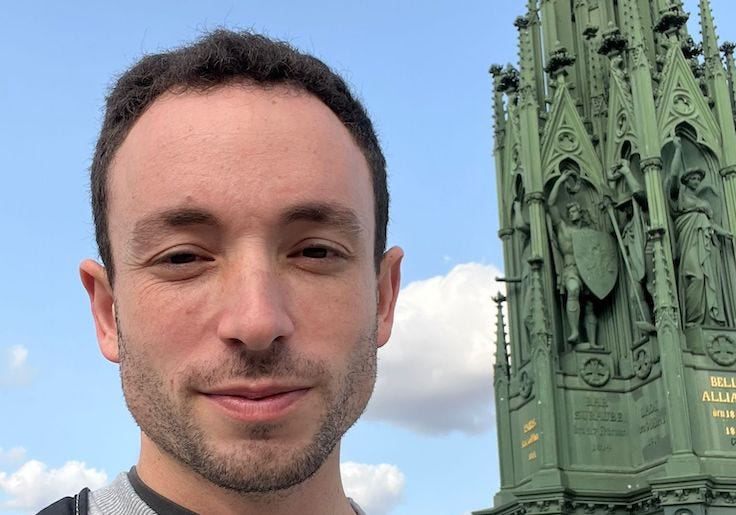Amid Eruption of Global Anti-Semitism, Many Israelis Say They Feel Safer in Jewish State at War
Stars of David were daubed on doors of Jewish homes, a Jewish community center was firebombed, and a convicted Islamic State terrorist was arrested on suspicion of planning to drive a truck
Andrew Tobin November 3, 2023
TEL AVIV—Itai Snapier, a 28-year-old graphic designer from Tel Aviv, saw his life in Berlin's LGBT community as an escape from conflict and chaos in Israel. Then, Hamas terrorists carried out a massacre in the Jewish state on Oct. 7, and the former Nazi capital erupted in anti-Semitism.
Stars of David were daubed on doors of Jewish homes, a Jewish community center was firebombed, and a convicted Islamic State terrorist was arrested on suspicion of planning to drive a truck into a pro-Israel rally. Snapier began to conceal his religion and nationality, even from members of his supposedly inclusive community.
"It was pretty clear you shouldn't speak Hebrew in the subway or on the street, and even when you texted, you tried to hide it," Snapier, who returned to Tel Aviv last week, told the Washington Free Beacon. "On social media, a lot of queer people—who always talk about diversity and acceptance—came out against Israel. These are people who go to the same parties as me and have the same friends. I thought we shared the same values, but apparently we don't. That made me afraid."
Israelis have generally been stunned by what they see as the hateful response in some corners to Oct. 7, the worst pogrom against Jews since the Holocaust, and the displays of anti-Semitism across the globe have reaffirmed Israel's foundational purpose: to allow the Jewish people to defend themselves.
"I feel safe here. I'm not afraid to walk down the street," Snapier said. "My fear now is whether we can continue to exist as Jews."
According to official statistics provided to the Free Beacon, nearly 65,000 more Israelis entered the country than left from Oct. 8 to Oct. 31. That number includes thousands of citizens who returned from Sukkot holiday vacations and thousands more who arrived to serve in the country's war against Hamas.
Hadar Chicko, a 32-year-old high school teacher from Rosh Ha'ayin, Israel, said she considered leaving Israel for the first time on Oct. 7.
"I thought, why do I need to do this to myself, to my family?" she told the Free Beacon. "I'll just go somewhere else and live a sane life."
But Chicko, who has a Romanian passport and two young children, changed her mind in recent days. After seeing scenes of anti-Semitic hatred and violence from Dagestan, Russia, to London to New York City, she decided to stay in Israel.
"It took me back to the Holocaust. Suddenly, I understood that they don't hate us because of what Israel is doing in Gaza. They just hate us, Jews, Israelis. I realized there is no one else who will protect us outside Israel," she said. "I wonder if I will even fly abroad again after this war. It's a question. I don't know."
Similar sentiments can be heard across Israel. As a Muslim mob roamed the Dagestan airport in search of arriving Israeli passengers, Israel's N12 news station warned viewers to be cautious about flying because Iran may be trying to foment attacks on Israelis abroad.
"From conversations I'm having with Jews in places like Canada, they tell me they would feel safer in Israel despite the war than they do there, in Canada, for example," added anchor Danny Kushmaro.
In a segment on Tuesday, "Anti-Semitism is on a rise in the world," N12 reported from pro-Palestinian demonstrations across Europe and the United States at which protesters looked forward to Israel's destruction and clashed with police. The station also broadcast scenes of activists tearing down posters of kidnapped Israelis and celebrating Hamas's atrocities.
"The State of Israel was established as a home for the Jewish people, so that every Jew in the world will have a place of refuge," intoned U.S. correspondent Yuna Leibzon. "But when this home is under attack, Jews around the world are also not safe."
Snapier said the climate of fear in Berlin reminded him of his family's stories about the 1930s in Germany.
"I would walk down the street and constantly ask myself, is that guy looking at me because I look like a Jew?" he said. "For me, that is so wrong because my grandmother fled Germany before World War II. I can’t believe it's happening again."
No one in Israel has been more disillusioned by the left's response to Oct. 7 than the writers at Haaretz, the country's elite left-wing newspaper.
"Haaretz's pages are filled with pieces decrying the hypocrisy of the global left, much of which is exposing an ugly moral rot when it comes to Israel. While rushing to defend the people of Gaza, they nimbly skip over the unfathomable cruelty of Hamas and its accomplices," columnist Ravit Hecht wrote in the paper last week.
Her colleague Moran Shor lamented days earlier that nowhere is safe for Jews anymore:
If we thought we could run away from here, we find we have nowhere to go. No one is waiting for us in Berlin and Paris. For years the progressive left has been getting worse and worse before our eyes. Now, they pretend to care about the Palestinians when in fact they only care about themselves. Dead Jews are a less fashionable cause than dead Palestinians, so it's OK to forgive barbaric terrorism and throw the state of Israel in the trash. The feeling is that there is nowhere to leave for, and it is impossible to stay. Here in Israel, it is impossible to raise children under the threat of missiles from the north and south and the disturbed evangelism from within.
Much of Israel, however, has been united in defense of the Jewish state.
"In every round of hostilities in recent years, I prayed for a quick end, deriding with revulsion the hollow, populist cries for the army to pulverize the enemy," wrote Hecht. "But this war, waged against the choke hold placed on us by Iran, should be led and won by Israel. This is a war of survival."
Yigal Palmor, a longtime Israeli diplomat, told the Free Beacon: "There is growing a feeling of the most basic patriotism but also a much greater fraternity and solidarity among all walks of Israeli society, including Arabs."
"These people who express support not just for Israel’s enemies, but for those who committed monstrous and inhuman crimes against Israeli women, elderly people, civilians in general, make it even clearer than ever before why we need an independent and sovereign state with a strong armed forces."
Palmor, now the spokesman for the Jewish Agency, a nonprofit that promotes "aliyah," or Jewish immigration to Israel, said it is too soon to say whether Oct. 7 and its aftermath will draw—or drive—more Jews to the country.
However, interest in aliyah has spiked in North America and the United Kingdom, according to Nefesh B'Nefesh, a nonprofit that facilitates such migration from the Anglosphere.
"We are witnessing a vast surge of interest in aliyah, with an unprecedented increase of over 100 percent in aliyah applications since Oct. 7 in comparison to this same period in 2022," Yael Katsman, the head of communications at Nefesh B’Nefesh, told the Free Beacon. "Ironically during the most difficult historic events, we see that individuals who might have been sitting on the fence are galvanized to move to Israel."
https://freebeacon.com/national-security/amid-eruption-of-global-anti-semitism-many-israelis-say-they-feel-safer-in-jewish-state-at-war/






